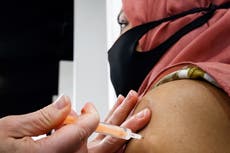New study reveals when people with Covid are infectious and for how long
Findings call into question current NHS guidance on infection control
The majority of people infected with Covid-19 are still infectious five days after their symptoms begin, new research suggests.
In the first real-world study of its kind, researchers from Imperial College London also found that a quarter of participants were still capable of passing on the virus after seven days.
The findings call into question NHS guidance on infection control, which recommends that people should remain at home and avoid contact with others for five days. There is no longer a legal requirement to self-isolate.
Dr Seran Hakki, one of the study’s co-authors, said there was a “lack of clarity around how to come out of self-isolation safely”.
“Our study is the first to assess how long infectiousness lasts for, using real-life evidence from naturally acquired infection. Our findings can thus inform guidance as to how to safely end self-isolation.”
The study followed 57 people who were exposed to an infected household member between September 2020 to March 2021 and May to October 2021.
The participants took daily tests, which were then assessed in a lab to determine how infectious their samples were.
Due to missing data among some participants, the duration of infectiousness was eventually measured in 42 people. There were 38 with a confirmed date of when their symptoms started and three were asymptomatic.
The study found that the average duration of infectiousness was five days, while only one in five participants were infectious before their Covid symptoms began.
Two-thirds of cases were still infectious five days after their symptoms began and one-quarter were still infectious at seven days, the research showed.
Lateral flow tests do not reliably detect the start of infectiousness, but can be used to safely shorten self-isolation, the experts added.
Based on their findings, the researchers recommend that people with Covid-19 isolate for five days after symptoms begin, then complete lateral flow tests from the sixth day. If these tests are negative two days in a row, it is safe to leave isolation, they say.
Professor Ajit Lalvani, the study author, said: “Self-isolation is not necessary by law, but people who want to isolate need clear guidance on what to do.
“Our data suggest that under a crude five-day self-isolation period two-thirds of cases released into the community would still be infectious – though their level of infectiousness would have substantially reduced compared to earlier in the course of their infection.
“NHS guidance for those with symptoms but who test negative is less clear about how long people should isolate for.”
The study did not assess the Omicron variants currently in circulation. There is some evidence that Omicron variants have a lower viral load and shed for less time than other variants, the researchers said.
Join our commenting forum
Join thought-provoking conversations, follow other Independent readers and see their replies
Comments



Bookmark popover
Removed from bookmarks